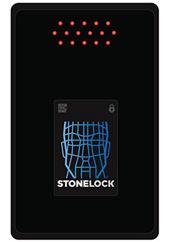Ten years ago the editorial office of Detektor was visited by a technical developer who wanted to show a new way of applying video surveillance. His name was Martin Gren from Axis Communication. The issue was network video, and how it was possible to convert analogue signals via a video server. This was a revolutionary technology which triggered Detektor to publish several articles covering the subject by the end of the nineties, which at the time stirred up the minds of the Scandinavian security industry. Then, it was considered that this technology did not meet the demands of security applications. Today network video is the fastest growing product area in security applications. This is the reason why, ten years later, Detektor visited the instigator of the network video, Mr Marin Gren, with somewhat of a nostalgic feeling. During the last few years, network video has developed to a major industry.
A stock market rocket
Axis has, over recent years become a rocket on the stock market, currently valued at just over 11 billion SEK (approximately EUR 1 billion). Axis was recently listed on the Nordic Exchange, Stockholm Large Cap and Information, Technology Exchanges. The route has however been long and eventful.
Martin Gren, Keith Bloodworth and Mikael Karlsson founded Axis in 1984. The office consisted of a study in the university town of Lund, Sweden. Mikael Karlsson was the economist and Martin Gren was the technical developer. The first product was a network based printer server which developed into a world leading product. With network products developed in-house, Axis developed more products, not least the network based surveillance cameras, which became world leading and still are today. Mikael Karlsson passed away due to an incurable disease at only 42 years of age, but the technical visionary Martin Gren continues the pioneering tradition. Being responsible for product development and as a major shareholder Martin Gren clearly puts his mark on the company.
Highly ranked in American press
Half a year ago Martin Gren was appointed one of the 25 most influential persons in the security industry. Behind the acknowledgment was the American trade publication, Security Magazine. No other Swede was on the list.
In addition the Security Technology and Design magazine included Martin Gren amongst the top ten individuals having had the greatest impact on the security industry.
In Sweden Martin Gren is a somewhat anonymous figure and he feels comfortable with that. The success of the company, the development on the stock market and his personal wealth and power seems to be of secondary importance to him.
"My prime interest is product development and to turn an idea or a product into a working and commercially viable product," he says.
A technical freak with integrity
Martin Gren, sees himself mainly as a product development manager with a genuine technical passion. This isn't limited to technical issues within the Axis business. When Detektor met him he didn't only talk about camera technology but was equally passionate about his children's TV-games or remotely controlled toys which he was happy to demonstrate. He is simply a father totally up-to-date with the IT environment of adults as well as that of children. Against that background it seems odd that he isn't the least interested in what most men are, namely cars. In asking him about his Lexus Hybrid he talks with less passion, and points out the shortcomings like for example that it is equipped with a tape recorder instead of a built in MP3 player and expresses his disappointment about a Bluetooth device which was not working. For him, it is purely the electronic devices that count, even in the car. There are no comments about road handling, comfort or performance. The common belief that all wealthy people like new cars seems to be an incorrect generalisation. At least in the case of Martin Gren.
- There is nothing more boring than buying a car, he comments and leaves the subject.
Martin Gren has no problems expressing differing opinions on various issues. He says what he thinks, privately as well as in his professional role and as a major owner of Axis. This makes him an interesting and very entertaining speaker.
Sony vs. Apple
In talking about expressing differing opinions Martin Gren has views on other companies like Sony, which is a fast growing competitor in network video. His view about Sony applies generally, in home electronics as well as in camera surveillance.
"Sony has a major problem by insisting on making far too much in-house. They keep introducing standards of their own that nobody wants. Just look at Memory Stick, sound compression, UMD and so on - all closed formats nobody wants," says Martin Gren. "This makes them slow to adopt new technology - which resulted in them losing their Walkman market to Apple. The same applies of course to network video where they make their own closed solutions and maintain analogue technology," comments Martin Gren.
That he is consistent in his belief is proven by the choice of TV games in his home. To be found are X-boxes and Nintendo WII - but no Playstation from Sony.
Failure
Ok, we have now portrayed Martin Gren as a bit of a technical freak, but to be fair both our conversation as well as the statements from colleagues reveal his interest and knowledge in business. Anything else would be strange, after all the phases Axis has gone through since the start in 1984. Included in the history are the successes with the printer servers and the network video products but also the risky and failed major investment in mobile Internet by the end of the nineties.
"At the time in the late nineties everybody talked about the mobile Internet. I was sceptical, but we decided to invest heavily in precisely mobile Internet, an investment amounting to tens of millions of EUROs to develop an interface, which would make us the leading player in this field. But as everybody knows, it didn't work out as expected."
Cash flow crisis
Martin Gren explains that at the time he would have preferred the activities of Axis to be focused on a different new business area, namely video, but a decision was made to go for mobile Internet, a market which - like network video - was far from developed. This investment almost finished off Axis as a company as finances became severely eroded. The stock exchange introduction rescued the company.
"If it hadn't been for the serious financial situation we wouldn't have gone for the stock market, Martin Gren explains who with this move elevated video to a priority business area. "The stock exchange saved Axis from a pending cash flow crisis. With new risk capital, we were given the possibility to continue", concludes Martin Gren, who is known not to be in favour of this kind of risk capital investment. He has in fact expressed doubts about stock exchange introductions in general. "Yes, that is true; I am basically against risk capital investments and have seen several examples of how too much risk capital injection can kill a good company. It is much better to ask friends and relatives for additional capital and use personal network contacts, he says.
The fact that the stock market in this case saved Axis makes no difference to his basic view in this matter. He goes as far as to say that he had preferred Axis not to have been listed on the stock exchange. This is rather interesting coming from a man whose shares are valued at approximately 100 million Euros.
40 percent growth
Axis had to struggle with major problems the first couple of years and the balance sheets in 2001 and 2002 were seriously weak. However the focus on video surveillance was strengthened, not least due to the appointment of Ray Mauritzon as MD who to this day runs the company. This coincided with a more marked acceptance of network video technology becoming more obvious. A growing number of players started to show up on the market with similar technical concepts, starting with a few minor companies particularly in Germany and in Asia after which the major giants followed. Today there is no doubt at all in which direction the technology is heading; network technology is growing by 40 percent per year according to the market research company IMS Research. To be found in the background are amongst others IT-giants like Cisco and IBM, both of which have shown an emerging but serious interest in establishing themselves in the network video business.
Today network video cameras amount to approximately 15 percent of the sales in Scandinavia.
Focus on image quality
Today network video has passed the initial phase. All manufacturers of any significance know that network video is the future. New trends today are the secondary effects of network video, for example mega pixel cameras for extreme picture quality or intelligent video.
"With the development towards an increasing number of mega pixel cameras we get surveillance systems with at least three times better picture resolution compared to the corresponding analogue technology. This means that the users of the images get an improved wealth of detail which means better possibilities to identify individuals and to see what is happening in the image field. This can be of value in for example crime investigations where the mega pixel recordings can become excellent proof for the prosecution," Martin Gren explains.
The picture quality in particular is something Martin Gren sees as important. This is why he feels that the big issue right now is Progressive Scan, i.e. the technology which scans the full picture, line by line 30 times per second as opposed to splitting the picture into separate fields as with interlaced scan technology.
"With progressive scan, noise in the picture can be avoided resulting in a sharper picture with more details visible," he concludes.
Intelligent video
In the case of intelligent video Martin Gren is a bit more cautious. "The commitments from the suppliers are impressive, but to be realistic proactive cameras with intelligent video are still at an infant stage. The current solutions on offer are suitable for well defined indoor environments, but not for much else, he concludes and gives examples of functions which in his view work today."
"People counting is a good application, movement detection and active tampering alarms are examples of other functions that work today as well as number plate identification, which is a well established technology in well controlled environments. But generally there is an element of overconfidence in the industry in what can be achieved with intelligent video analysis," says Martin.
Analogue systems still biggest competition
In spite of fierce competition Axis maintains its world leading position in the market place, why is that?
"We are very focused on our partners, and always have been. The dealer is king with us and we stick to that model and don't try to compete with them. We are solely a manufacturer and developer. This model has generated strong bonds of loyalty between us and our partners, which is an important factor in our success in the market place," he explains.
Who does Martin Gren see as the biggest competitor for Axis in the years to come? "Predominantly it is companies supplying analogue camera equipment. After all, analogue systems still accounts for 90 percent of the total world market," he concludes.
09/05/2008















